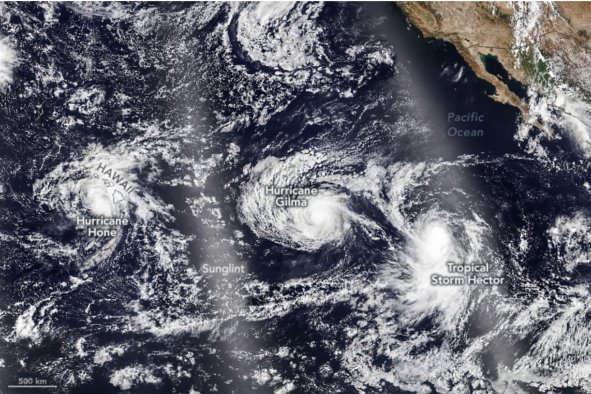Sea temperatures in the Persian Gulf have soared to nearly 100 F, just short of the Earth's record high.
NASA data revealed that the surface of the water between Iran and the Arab Peninsula hit a mind-boggling 97.7 F last week.
This comes mere months after the Earth's average sea temperature hit an all-time high in February this year.
"Sea surface temperatures hit 97.7°F (36.5°C) in the Persian Gulf this past week," weather analyst Colin McCarthy wrote on X, formerly Twitter, on Saturday. "One of the highest sea surface temperatures ever recorded on Earth."
"The dark red shading of the entire Persian Gulf indicates sea surface temperatures of 89.6°F (32°C) or higher."
What is thought to be the highest sea temperature on record was detected by a water temperature sensor in Florida's Manatee Bay last July, which recorded a sweltering 101.1 F. However, this record has not been totally confirmed, as there remains the possibility that the sensor was malfunctioning.
The prior record was set in the waters off Kuwait in 2020—also in the Persian Gulf—where temperatures of 99.7 F were detected.
Sea temperatures worldwide have been steadily climbing for decades, with record temperatures broken with increasing frequency. According to the U.S. Environmental Protection Agency (EPA), between 1901 and 2023, sea surface temperatures rose at an average rate of 0.14 F per decade.
"Sea surface temperature has been consistently higher during the past three decades than at any other time since reliable observations began in 1880. The year 2023 was the warmest ever recorded," EPA explains.
As global air temperatures increase due to global warming and climate change, the oceans also warm, as oceans absorb over 90 percent of the excess heat from greenhouse gases.
February 2024 saw the highest average sea surface temperatures worldwide ever recorded, at 69.91 F, surpassing the previous record set in August 2023 of 69.76 F, according to Copernicus data.
The average worldwide daily sea surface temperature also reached a new absolute high of 69.96 degrees towards the end of the month. Nearly 50 days over the past year have broken sea surface temperature records for the time of year.
Increasing sea temperatures may cause increased coral bleaching, affecting the marine ecosystems that depend on them, as well as more intense hurricanes, cyclones, and typhoons, rising sea levels, and ocean acidification.
"The record global warmth we have been experiencing in February 2024 and over the past year is almost entirely due to continued greenhouse gas emissions from human activities, though lower levels of harmful aerosol particle pollution in some regions is also now contributing a bit to warming rather than masking it," Richard Allan, a professor of climate science at the U.K.'s University of Reading, said in a statement. "Global temperatures have been given an extra boost by warm El Niño conditions affecting thousands of miles of the equatorial eastern Pacific and although this slow ocean fluctuation has peaked, its warming influence will linger during 2024."
"What is more surprising is that sea surface temperatures are at record levels over regions far away from the centre of El Niño action such as the tropical Atlantic and Indian Ocean. The widespread substantial warmth of the sea surface is consistent with a combination of ocean fluctuations on top of a continued powerful heating effect from rising greenhouse gas concentrations and other smaller factors," he said.
These sea surface temperature records come as the Earth has seen a streak of record-breaking hot air temperatures, with June 2024 marking the thirteenth month in a row that is the warmest on record for that month.
"June 2024 was warmer globally than any previous June in the data record, with an average ERA5 surface air temperature of 16.66°C, 0.67°C above the 1991-2020 average for June and 0.14°C above the previous high set in June 2023.
According to ERA5 data, the month was 1.50 C (2.7 F) above the estimated June average for 1850-1900, the designated pre-industrial reference period, making it the twelfth consecutive month to reach or break the 1.5 C threshold.
The global-average temperature for the past 12 months (July 2023-June 2024) is the highest on record, at 0.76 C above the 1991-2020 average and 1.64 C above the 1850-1900 pre-industrial average.
This streak was broken in July, as July 2024 was the second-hottest July on record after July 2023. However, we did see the Earth's two record-hottest single days on record on July 22 and 23, with worldwide average temperatures hitting 62.89 and 62.87 degrees F respectively.
"There's now so much evidence pointing to the fact that our climate is warming, if you want to deny climate change, you might as well claim the earth is flat too. Billions of measurements from weather stations, satellites, ships, and planes point to the very basic fact that our planet is heating up at a dangerous pace," Friederike Otto, a senior lecturer in climate science at Imperial College London, said in the statement.
"People should not be surprised that we have broken another record. Humans continue to burn oil, gas, and coal, so the climate continues to warm. It is a very well understood relationship," she said. "There is no silver bullet or magic fix for climate change. We know what to do—stop burning fossil fuels and replace them with more sustainable, renewable sources of energy. Until we do that, extreme weather events intensified by climate change will continue to destroy lives and livelihoods."
Do you have a tip on a science story that Newsweek should be covering? Do you have a question about sea temperatures? Let us know via science@newsweek.com.
Disclaimer: The copyright of this article belongs to the original author. Reposting this article is solely for the purpose of information dissemination and does not constitute any investment advice. If there is any infringement, please contact us immediately. We will make corrections or deletions as necessary. Thank you.




